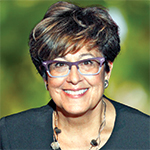
Marie Sullivan
When Marie Sullivan became president and CEO of Arizona Women’s Education & Employment (AWEE) in 1997, the nonprofit organization’s funding was holding steady in the $400,000 range. “Today it fluctuates between $2.9 million and $4.5 million,” Sullivan says.
Referring to nonprofits as “curious beasts” that have to rely on a lot of sources for their funding and subsequently stay afloat, Sullivan says her job can be like a teeter-totter. “One year we will have a lot of public funding, and then the next year it will teeter to the other side.”
To be as intentional as possible about finding diverse funding for AWEE — which provides a variety of programs and services to both women and men in Maricopa and Yavapai counties who want to better their employment opportunities — Sullivan says it has been crucial to surround herself with an outstanding team of people who share her vision and passion. “You have to find people who are willing to go the distance with you and be flexible — strong in their own sense of being aligned with your mission, believe in the same outcomes and similar culture, and believe in their own ability to be flexible.”
Finding these like-minded people, Sullivan says, involves being exceptionally clear during the interview process about what the job entails. “I always try to be as clear with my expectations as possible and articulate what I want them to do from the beginning,” she says, adding that this is true regardless of whether she is hiring someone for a specific job or a series of tasks. “But beyond the tasks, I’m also looking at their energy level, and if they have critical thinking skills, and if they are team players. This will all help to inform me if they will be a strong member of my staff.”
In addition to her outstanding team, Sullivan says she was able to improve AWEE’s funding situation by paying attention to and being cognizant about the community they are serving, as well as both predicting and analyzing the data about the nonprofit. “Whatever your mission is and the product, you want to be sure it is relevant to the community and its needs and wants. You have to pay attention and try to forecast where the teetering and tottering will happen. You also have to be willing to be flexible as to what you have observed and what the data is telling you,” she says.
Being a positive role model is important, especially when bumps in the road come along, Sullivan says. She recalls a time when AWEE literally lost $1.2 million overnight after a funder ran into some issues and was unable to donate the money. Knowing that the way she handled the situation would have a huge impact on her team, Sullivan says she was very careful about how she told them what had transpired. “I didn’t say, ‘I have bad news,’ but instead I said, ‘We’re going to get through this’ and where and how we could start.”
Sullivan and her team got to work looking at the various components that the funder had planned to support and determining who else might be willing to take them over. “We looked at which pieces would be attractive to other funders and then took them and found multiple funders for many things. We also kept our relationship with the funder so that, over time, we would still be in their good graces, so we stayed in conversations with them.”
An important part of Sullivan’s success, she believes, is being acutely aware that her staff is watching her at all times, explaining this knowledge inspires her to be outwardly positive and passionate about her work at all times. “You have to be sure you are walking the walk as well as talking the talk; in a lot of ways it’s like mentoring,” she says. In fact, individuals tell her how much she inspired them. “I often think, ‘I never had a formal conversation with you,’ but you really are mentoring people without ever knowing it. People have to be inspired by your own passion, which in itself is motivating.”
AWEE: Transforming the Lives of Arizonans
Since its inception 32 years ago, AWEE has helped more than 160,000 men, women and young adults who are currently employed or re-entering the work force.
Beginning in 1998, Marie Sullivan led AWEE to expand its program services — first to domestic violence victims, followed by creating and expanding programs for women who were in prison and ex-offenders. AWEE is now recognized as the expert in serving special populations of women in their workforce development needs.
AWEE offers case management and support services, career services, client training workshops and educational guidance.
Sixty-nine percent of the people AWEE helps are women, and 31 percent are men. Forty-six percent are minorities and 29 percent are educated above the high school/GED level.














